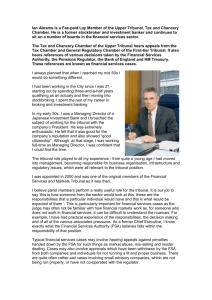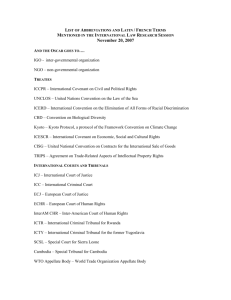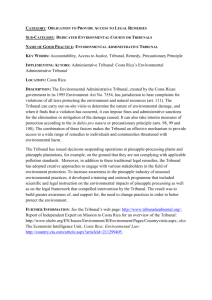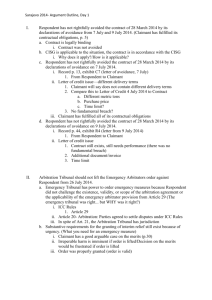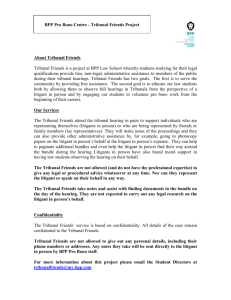Bano - Finding Fact and Weighing Evidence
advertisement
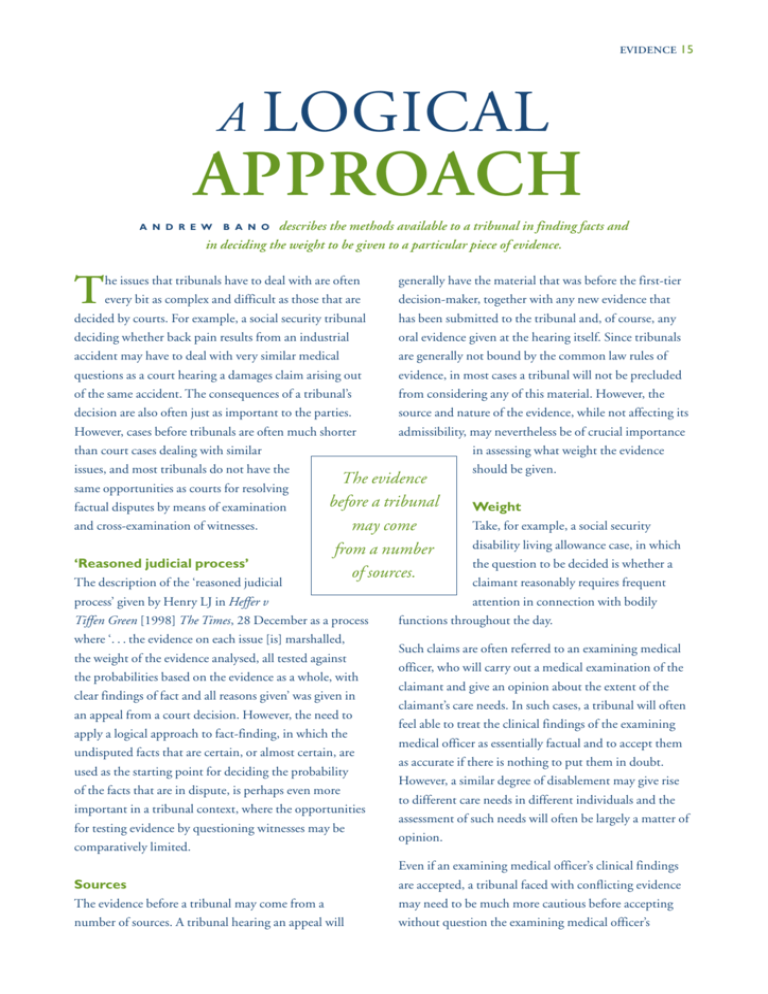
EVIDENCE 15 A LOGICAL APPROACH describes the methods available to a tribunal in finding facts and in deciding the weight to be given to a particular piece of evidence. A N D R E W B A N O he issues that tribunals have to deal with are often T generally have the material that was before the first-tier every bit as complex and difficult as those that are decision-maker, together with any new evidence that decided by courts. For example, a social security tribunal has been submitted to the tribunal and, of course, any deciding whether back pain results from an industrial oral evidence given at the hearing itself. Since tribunals accident may have to deal with very similar medical are generally not bound by the common law rules of questions as a court hearing a damages claim arising out evidence, in most cases a tribunal will not be precluded of the same accident. The consequences of a tribunal’s from considering any of this material. However, the decision are also often just as important to the parties. source and nature of the evidence, while not affecting its However, cases before tribunals are often much shorter admissibility, may nevertheless be of crucial importance than court cases dealing with similar issues, and most tribunals do not have the same opportunities as courts for resolving factual disputes by means of examination and cross-examination of witnesses. in assessing what weight the evidence The evidence before a tribunal may come from a number of sources. ‘Reasoned judicial process’ The description of the ‘reasoned judicial process’ given by Henry LJ in Heffer v Tiffen Green [1998] The Times, 28 December as a process where ‘. . . the evidence on each issue [is] marshalled, the weight of the evidence analysed, all tested against the probabilities based on the evidence as a whole, with clear findings of fact and all reasons given’ was given in an appeal from a court decision. However, the need to apply a logical approach to fact-finding, in which the undisputed facts that are certain, or almost certain, are used as the starting point for deciding the probability of the facts that are in dispute, is perhaps even more important in a tribunal context, where the opportunities for testing evidence by questioning witnesses may be comparatively limited. should be given. Weight Take, for example, a social security disability living allowance case, in which the question to be decided is whether a claimant reasonably requires frequent attention in connection with bodily functions throughout the day. Such claims are often referred to an examining medical officer, who will carry out a medical examination of the claimant and give an opinion about the extent of the claimant’s care needs. In such cases, a tribunal will often feel able to treat the clinical findings of the examining medical officer as essentially factual and to accept them as accurate if there is nothing to put them in doubt. However, a similar degree of disablement may give rise to different care needs in different individuals and the assessment of such needs will often be largely a matter of opinion. Even if an examining medical officer’s clinical findings Sources The evidence before a tribunal may come from a number of sources. A tribunal hearing an appeal will are accepted, a tribunal faced with conflicting evidence may need to be much more cautious before accepting without question the examining medical officer’s 16 EVIDENCE assessment of the extent of the claimant’s care needs. In a tribunal context, the difference between evidence of fact and evidence of opinion does not affect the admissibility of evidence, but may crucially affect its weight. Conflicts Evidence from different sources may at first sight appear to be conflicting and, although a tribunal may ultimately have to reject evidence, it should not do so without first considering whether apparent differences in the evidence can in fact be reconciled. Serious misconduct In assessing probabilities, it is also necessary to bear Differences in evidence can often be explained by in mind the common law principle that more cogent differences in the perspective of the witnesses. If evidence will be needed to prove serious misconduct a tribunal tries to evaluate an item of evidence in than misconduct that is less serious. Tribunals are conjunction with all the other evidence, it will often be sometimes called on to deal with very serious issues, found that far from conflicting with other evidence, each for example, decisions such as whether a claimant was piece of evidence contributes to a better understanding married to a person who paid national of the picture as a whole, or, in Lord insurance contributions in a claim for Devlin’s words, ‘the text with illustrations’. widow’s benefit. Differences in A finding by a tribunal that a claimant has falsely claimed to be married to an individual will clearly need more compelling evidence than, for example, a finding that a claimant has exaggerated the extent of a disability. evidence can often be explained by differences in the perspective of the witnesses. Relevance Since tribunals often have to make decisions on the basis of relatively slender evidence, it is particularly important to make sure that each piece of the evidence which is available to the tribunal plays a full part in the process of fact-finding. A common mistake by tribunals is to disregard or place little weight on evidence that has not been obtained in connection with the tribunal proceedings. However, it is only rarely that relevant evidence cannot contribute in some way to a better understanding of the picture as a whole. For example, cases involving children sometimes throw up what appear to be at first sight irreconcilable differences in the evidence. A school report will often describe a child whose behaviour is only very slightly out of the ordinary and who has no particular care needs in the school environment. Such evidence may appear in stark contrast with the evidence of the child’s carers, or other professionals, painting a picture of a child requiring a very high degree of supervision. In some cases it may not be possible to reconcile the different accounts of the child’s behaviour, and a choice will have to be made. However, in many cases the differences in the evidence can be explained by genuine differences between the child’s behaviour and needs in the school environment and his or her behaviour in a less controlled and secure environment outside school. In terms of Lord Devlin’s metaphor, in such cases the different illustrations of the child’s behaviour in different Evidence in documents written for unconnected settings, and seen through different eyes, does not purposes may well be more reliable than evidence create a conflict of evidence, but contributes to a better obtained in connection with the proceedings, so that a understanding of the text as whole. report prepared, for example, by a consultant surgeon in connection with unconnected civil proceedings may well be extremely valuable in resolving medical issues arising in, say, a war pensions appeal. Experts Although the involvement of experts is one of the defining features of the tribunal system, care must be EVIDENCE 17 taken to ensure that the use of a tribunal member’s The starting point in assessing credibility is what Robert expert knowledge does not lead to unfairness. In Goff LJ called in Armagas Ltd v Mundogas SA [1985] 1 Butterfield v Secretary of State for Defence [2002] Lloyds Rep 1 the ‘objective facts and documents’, but EWHC 2247 (Admin), Park J held that if a medically as we saw in the first article in this series (in the autumn qualified member of a tribunal who was the only 2005 issue of the journal), it will also be necessary to person present with specialist knowledge saw a possible consider the motives of the witnesses and any interest medical objection to the claimant’s case, he must draw they may have in the outcome of the dispute, how well it to the claimant’s attention and if necessary offer the placed the witnesses are to give reliable evidence, and the claimant an adjournment to consider the point ‘however internal and external consistency of the evidence. inconvenient and irksome that may be’. If a tribunal reaches a provisional conclusion on the basis of its own expert knowledge, the parties must therefore be given an opportunity of challenging the tribunal’s view and, if necessary, offered an adjournment to enable them to do so. Oral evidence A logical approach to fact-finding can be used whenever the facts of a case are in dispute, and in many ways a ‘paper’ hearing offers a better opportunity than a hearing with oral evidence for tribunal members to develop the skill of making logical deductions from undisputed facts. But because the demeanour of a witness is such an unreliable guide to credibility, it will almost always be necessary to test the consistency of a witness’s evidence against the facts that are agreed, or that can be established by other evidence. That is not to say that the way in which a witness gives evidence should be disregarded. The consultation exercise carried out by the Council of Tribunals and the research summarised by John Raine and Eileen Dunstan in the spring 2006 issue of this journal highlight the importance of the oral contributions of participants in tribunal proceedings. The way in which a witness gives evidence may, for example, add emphasis, convey uncertainty or indicate strength of feeling. The key theme to emerge from the cases discussed in this series is that oral evidence should never be evaluated in isolation from the other evidence in the case. In the tribunal system, in which evidence is often sparse, it is perhaps even more important than in the courts to make sure that each piece of the evidence plays a full part in the decision-making process, and that the tribunal’s conclusions are reached on the basis of the evidence as a whole. A N D R E W B A N O is a Social Security Commissioner. The experience of listening to a witness giving reading a transcript, and a tribunal member may need to observe a witness carefully in order to get the maximum advantage from the opportunities that an oral hearing provides. The chairman was finding it difficult to adjust to the concept of a paperless tribunal. www.asillustration.com evidence is likely to be much more informative than




